'Farming': Inside the incredible story of a Nigerian immigrant who joined a skinhead gang
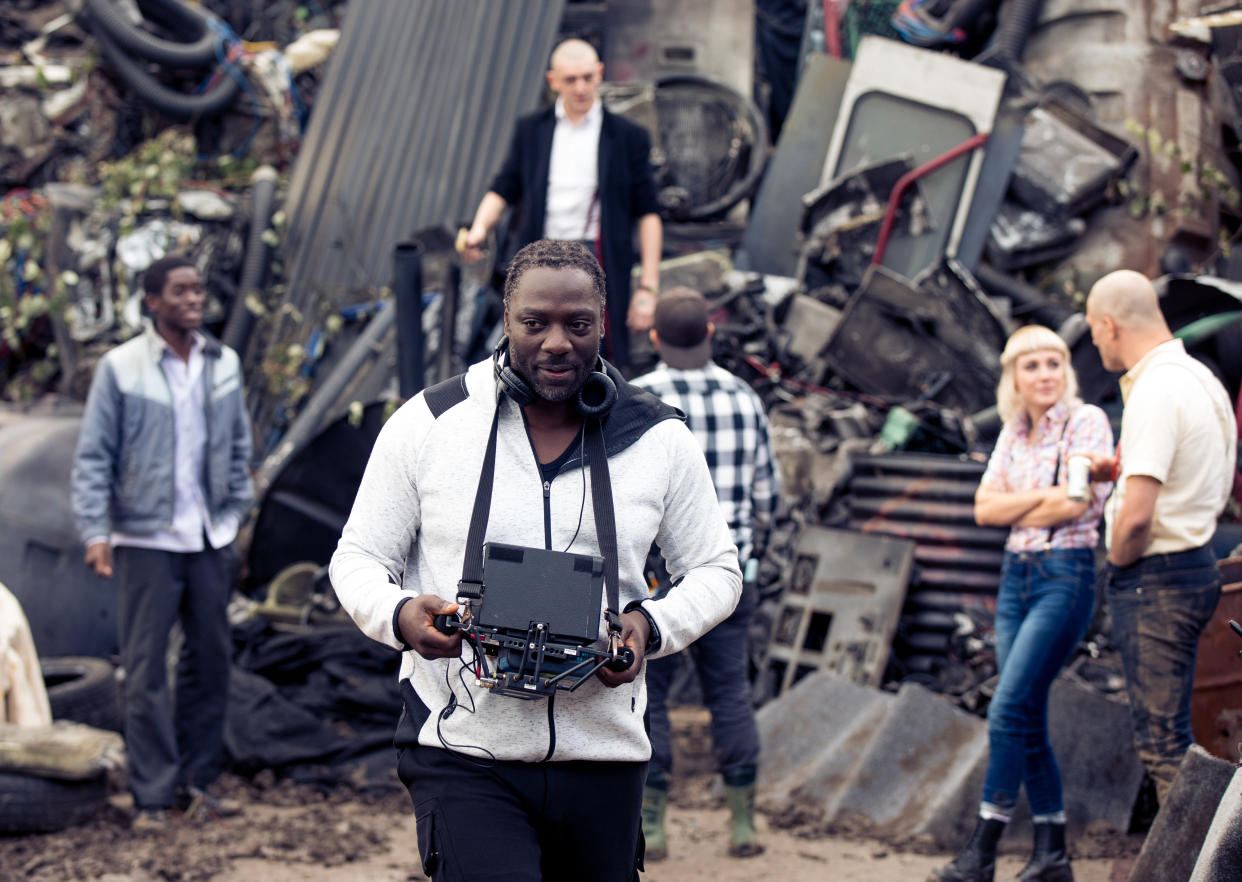
Adewale Akinnuoye-Agbaje has spent the last decade trying to adapt his own life.
It’s no mean feat for any filmmaker, but perhaps moreso for the 51-year-old Suicide Squad and Lost actor in the case of Farming.
The film is his raw, fearsome directorial debut, which takes its title from the trend of Nigerian parents handing their kids to white foster families, which was popular in the UK between the 1960s and 1980s.
The film’s protagonist Enitan, played by Damson Idris, comes to loathe his own heritage and even joins a group of racist skinheads, yelling about wanting to “keep Britain white”.
Read more: Donald Trump calls Hollywood racist
But for Akinnuoye-Agbaje, this is more than just a timely, potent story - it’s a reckoning with his own past as a ‘farmed’ child who fell in with a white supremacist gang.
He has been trying to get the film made for many years, but says it’s perhaps more relevant today than it has ever been before.
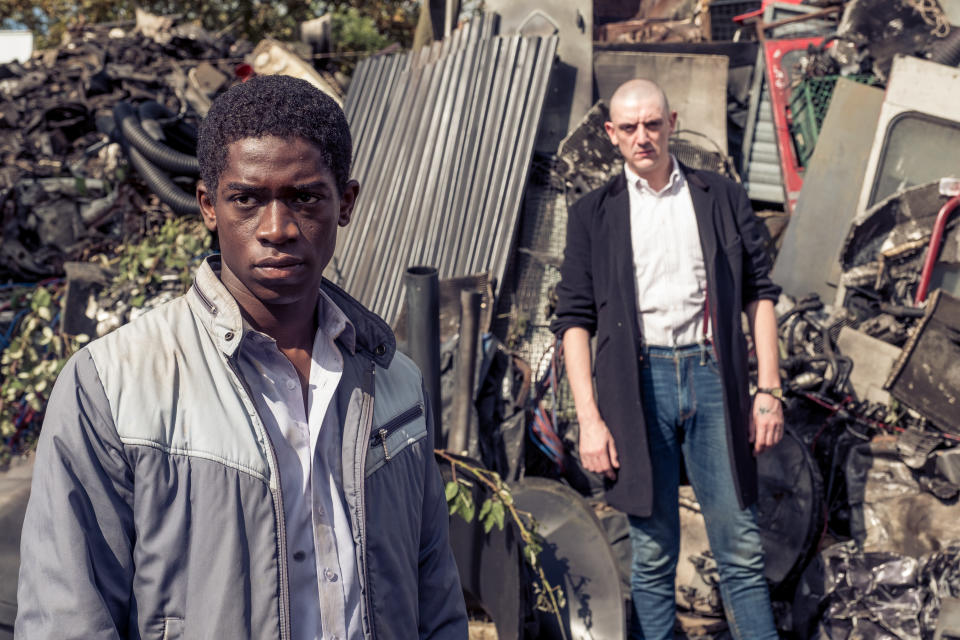
“I think, socio-politically, this is the voice of our times,” he says.
Read more: Gurinder Chadha on casting National Front extras in Blinded By The Light
“Even though it's a period film, there are things that are explored in Farming — identity, immigration, belonging — that are very prevalent today with things like Brexit and with Amber Rudd trying to expel the West Indians and having to resign.
”All of those things are very present today.”
Akinnuoye-Adbaje plays his own father in this most personal of projects and views the film as a “starting block” for important dialogue about the immigrant experience.
Read the full interview with Adewale Akinnuoye-Adbaje for his thoughts on casting the younger version of himself, why his film had to be made today and how close he came to playing Black Panther on the big screen.
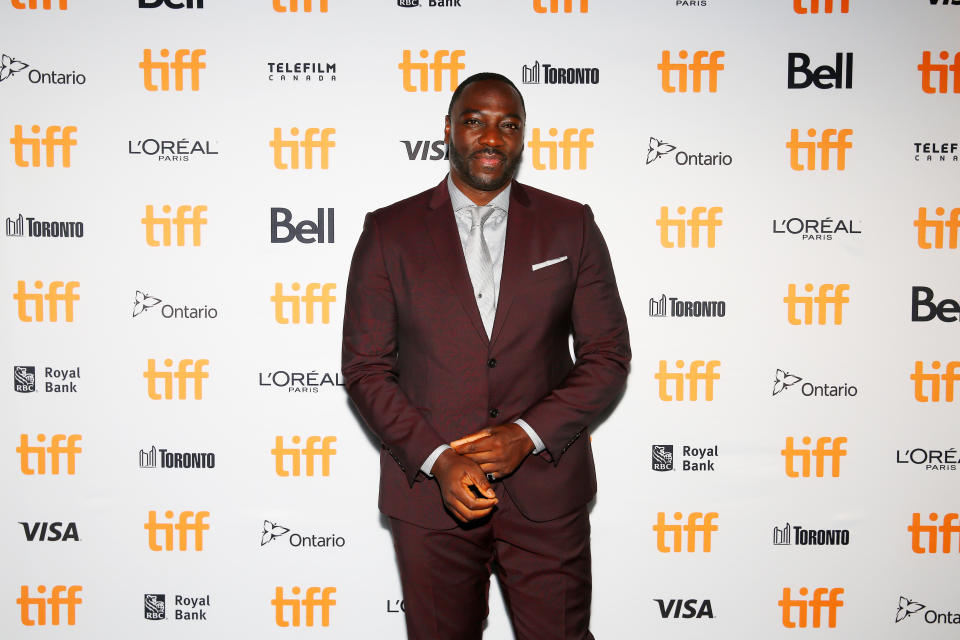
Yahoo Movies UK: While I was watching the film, I found myself wondering which bits were real and which needed to be invented for the sake of drama. How did you find that balance when making it?
Adewale Akinnuoye-Adbaje: First of all, the film has lived with me for such a long time. I have had many nights of rehashing and regenerating ideas about how to convey it cinematically. And also, I’m telling a true story in the medium of entertainment, so I know that there’s an obligation to entertain. That gave me poetic licence to actually position certain sequences in a different manner from which they may have occurred, or amalgamate characters. For instance, Ms Dapo [a teacher played by Gugu Mbatha-Raw] represents three people that were in my life back then and really supported me but, for the purposes of the film, I amalgamated them into one.
Even though I never personally stabbed anybody, that was a very real element in the world that I existed in, so I gave that element to the lead character to demonstrate that it was a life and death situation. But the essence of the narrative and story is very true. I was ‘farmed’ at six weeks old and had that desperate search for belonging and an identity.
Merging into a skinhead gang for a belonging and a validation was all true. Also, the self-hatred that was engendered by the racial abuse that was constantly inflicted upon me both in the house and outside. All of that is all very true, but you have to fictionalise some parts for dramatic impact, or take poetic licence to tell the story so that it entertains. We’re not making a documentary.
And in terms of ‘how do you do that?’, you have a team around you that is really your objective voice. You have producers — a committee, I call them — financiers, my trusted editor Tariq Anwar. He is one of the best out there — he did American Beauty and The King’s Speech — so I was in such capable hands. That enabled me to take a step back and fall upon them for my objectivity.
It wasn’t an easy process, I’ll be honest with you, because there are sequences that were shot that were not put in the movie, even though they happened in my life. Because we wanted the pace of the film, they were taken out. But the way I looked at it is that the film is really a starting block for dialogue. So if people want to know the true story, that’s where I come in and talk in interviews like this.
On that basis, I wanted to ask: why now? Both in terms of your career and in political terms. Windrush is obviously there at the beginning of your film, for example. Why was now the right time?
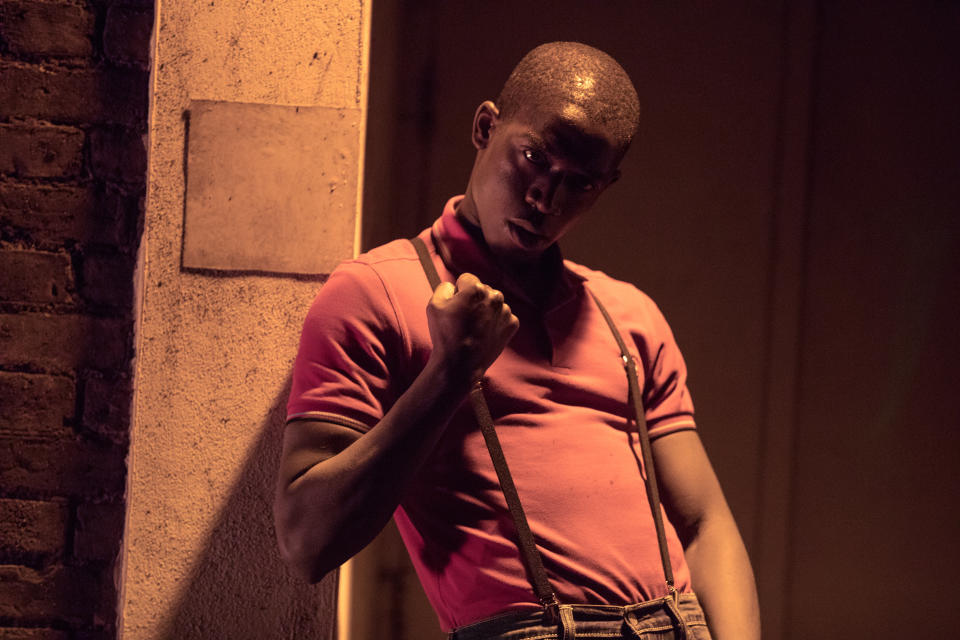
Honestly, I’ve been trying to make this film for more than 10 years. I think it happened at its right time. At the time I was trying to make the film, both professionally and ethnically, I was not the right person to do it. Back in those days, actors were not looked upon to direct. It wasn’t common. And with black actors, it was even more rare, so it was a tough time to make a film like this. Now the times have changed.
But I think socio-politically, this is the voice of our times. Even though it’s a period film, there are themes that are explored in Farming — identity, immigration, belonging — that are very prevalent today with things like Brexit and with Amber Rudd trying to expel the West Indians and having to resign. All of those themes are very present today.
The story is essentially about my life growing up as a young black boy in Britain in the 70s under the phenomenon of farming. I couldn’t tell my parents’ journey but I wanted to set the stage for what it was like for them coming into the country when they came over. Hence, the Windrush, the Enoch Powell references, the ‘Keep Britain White’ slogans. It was by no means easy for them and it was about creating the environment which would’ve made them want to make these choices about giving their children away. And also, it helps the audience understand what it was like at that time for black people in Britain. So I had to do it, in a very short space of time, and without doing a whole other movie about my parents’ journey.
When you got to the point that you were making this film, how difficult was it to find someone to play you?
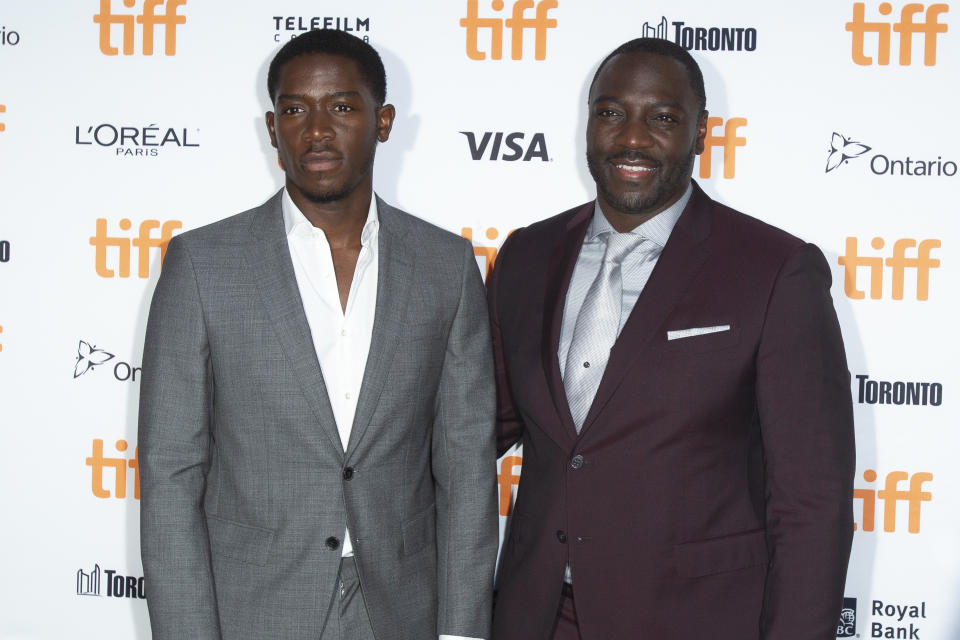
I thought it was going to be challenging, but it was actually one of the easiest tasks in the whole process. Helped by the wonderful casting director Jina Jay, we found our young Enitan [Zephan Hanson Amissah] very quickly within two weeks of the search. It was very apparent that he was precocious, talented and looked great. We already had the older Enitan, Damson Idris, so he looked like him as well. We found him quite early — a young Ghanaian actor who was only 10 years old.
To find Damson, we cast the net wide. I was looking to get an unknown so that I could take somebody who had that raw energy and harness it. I found the best of both worlds in Damson because he’s relatively new as an actor. He’s had enough experience, but he’s not polished. One of the challenges in looking for that character is that many of the actors gravitated to the violent tendencies, but what I needed was someone who could emote the sensitivity of the character because I was a very sensitive child. Because of the nature of the subject matter, it was really important that the actor was able to emote a natural sensitivity so you could root for him no matter what he was going through or what he was about to do. Damson was extraordinary.
One of the most impressive bits of casting for me was John Dagleish, as the skinhead gang leader. He’s terrifying. I was talking to a critic after the screening who had seen him in period stuff and musical theatre and I couldn’t believe the same guy was capable of that.
John was a goldmine of a find. As you know, he’s an accomplished theatre actor. The same challenges were there in that actors gravitated towards the one-dimensional violent tendency. It was about commanding the screen without exerting — that innate charisma and menace without actually having to be violent, because that in itself is a violence. John was extraordinary. If you know him, he’s the sweetest guy ever, so the transformation is remarkable. Also, his attention to direction was great.
There were challenges for him. After each scene, he kept apologising to Damson and I had to pull him aside and said: “Listen, you can give him a bro hug at the end of the movie, but for now I need you to stay in the pocket because the ends will justify the means.”
Read more: Sam Rockwell wants to stop playing racists
It must be so hard to get into the head space of someone so horrible and then to have to stay in it?
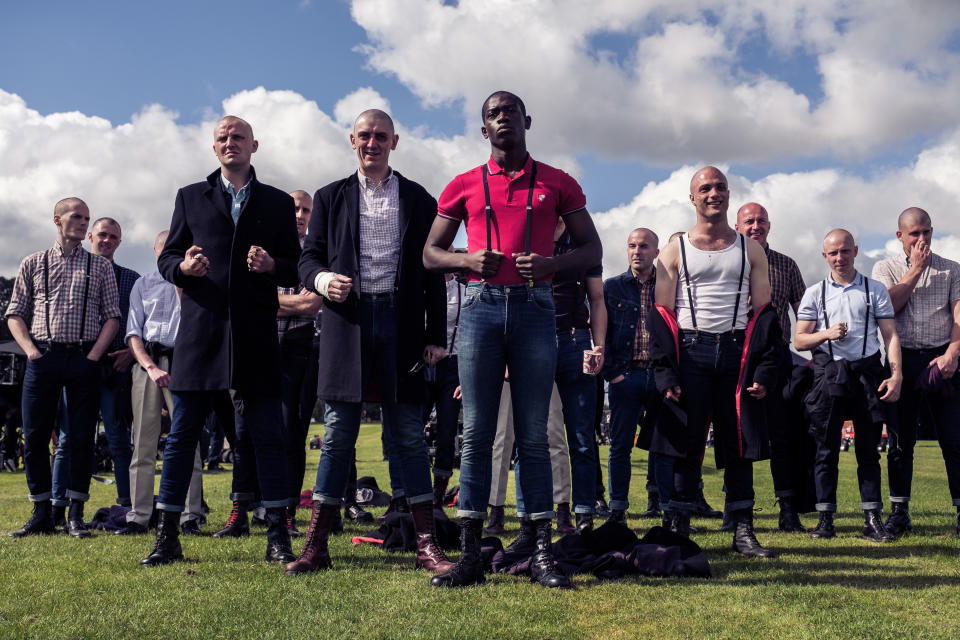
I think that, as an actor and because I come from that world, they were more inclined to trust me. I know from first-hand experience what it’s like. It’s hard for five weeks to sit and reside within that character — particularly for Damson, as his character doesn’t really say more than 10 words throughout the whole movie. It’s more challenging because you’re emoting.
I remember him doing one of the toughest scenes, where he’s spray painted by the skinheads, and he said “right, that’s one of the toughest scenes done, I can relax now”. And I had to impart upon him that every scene you do is layered with pain, humour, joy and hurt, so every scene you’re going to do is gonna be tough. So it’s a case of blocking off those five weeks and digging in. He got through it and he did a marvellous job.
Even Kate Beckinsale, though, it’s tough to be horrible to children convincingly.
It feels quite against type for her too. A lot of her work is also in the period drama world?
She was a wonderful find for Ingrid — Enitan’s adopted mother. I needed an actress that had the natural charisma of a star, but the gravitas of someone who could command respect in a room full of very accomplished actresses — you had Ann Mitchell and Jaime Winstone in there. They bring their game so I had to find an actress who had their own innate gravitas and Kate was wonderful in another very challenging role.
I want to pick up on your point about being violent without having to carry out acts of violence. How did you judge that, I guess? Obviously, part of it is from your experience, but how did you judge how far to push the racism, the epithets and of course the violence?
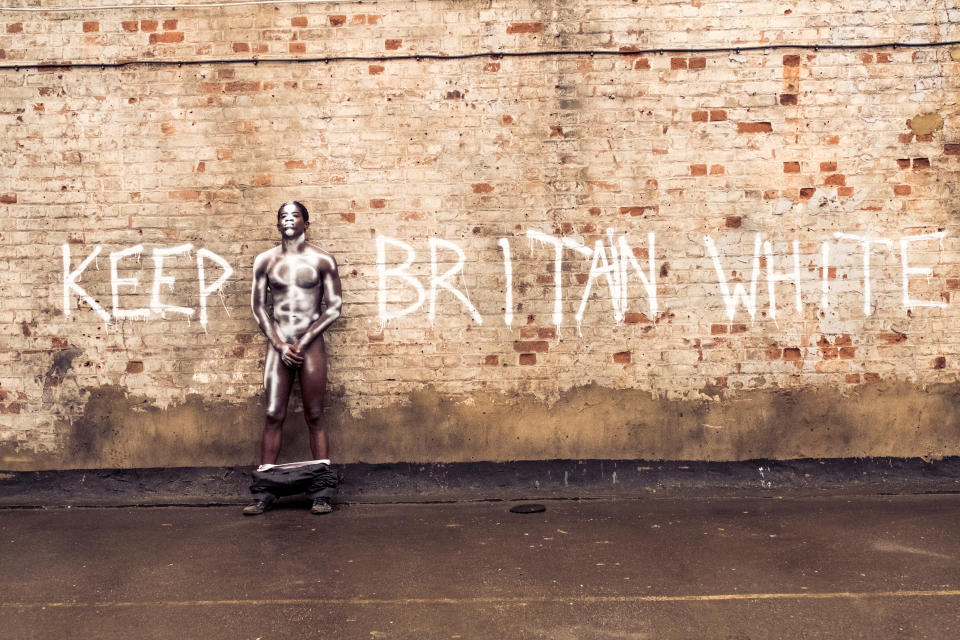
One of the things I’ve found in film is that you should never underestimate your audience. The mind is a powerful thing and I think you’ve got to leave a certain space for people to conjure their own thoughts and emotions. For instance, when Enitan is fighting the opposing guy in the gang and he gets left on the field, you know what’s going to happen. The horror of what happens is more vivid and visceral in your own mind than it is on the screen. You leave the people to conjure that for themselves. That was a tactic that I used throughout the film. The subject matter is disturbing and can be violent emotionally, so it was important to temper the violence and only use it when it was needed.
Read more: Peaky Blinders creator defends violence
It was part of the fabric and the wallpaper of that world. I tried to use it as dialogue, only when it was needed. It was something I thought about, but again I used my team of producers and my editor as an objective sounding board. Having gone through the experience and lived it, I knew exactly what I wanted to convey but, for how much it that needed to go in there, I would bounce off them as well.
We talked about the scene where he was painted and that, I think, is the perfect example of what we’re talking about. You build up all of these scenarios in your head and then what happens is almost worse because it’s so emotionally violent.
The emotional violence is far more traumatic. Less is more in terms of the physical violence. And also, I wanted to create a situation where you would be laughing at a point where you shouldn’t be. There was humour in the violence and even in the epithets. They were used naively and ignorantly, but it had to have genuine humour for the people saying it. Even though it was emotionally traumatic for the recipient, it should almost be humorous for the audience — like a taboo giggle. You shouldn’t be laughing. It’s that scenario.
I tried to mix the balance, not only because it allowed me to temper the violence, but because that was a very real part of that world. Very often, the violence would come out of nowhere and there was always jokes immediately before or after doing it. I needed to convey the reality of that. This is not an action movie per se. It’s an action-drama based upon a real life situation.
You mentioned action there and, in the last couple of minutes I’d like to switch gears if I can. I was reading earlier that you were almost Black Panther on screen. Is that true?

I actually don’t know. I’ve done a couple of Marvel films and I think we were at a point where we had discussions about other things I would like to pursue and I took a meeting. As an actor, you do these meetings and some of them go somewhere, but some of them don’t. What I can say is that, having seen the latest rendition, I’m just happy that it came out. The impact it has had in the industry in convincing them that there is a palatable black audience for black films has only strengthened the audience for a film like Farming. But certainly, I did take a meeting about it.
Read more: Inside Marvel’s more diverse Phase Four slate
I wanted to talk about Killer Croc as well. What did you think of the reaction to Suicide Squad and would you be open to playing the role again?
To be quite honest with you, I think I went on to something quite quickly afterwards. Particularly with that kind of genre movie, I don’t take the criticism or reactions too seriously. It’s supposed to be just fun. But it won an Oscar for Best Makeup, which I was a part of. I spent five hours in the chair doing it every day, so I was very gratified that it got a nod from our peers.
But would I do it again? I don’t think I need to, to be honest. I think I did it, I enjoyed it, it bought me a Bentley and I will keep moving on. I’m very happy where I am with filmmaking and developing some of the stories I want to tell.

 Yahoo Movies
Yahoo Movies 
